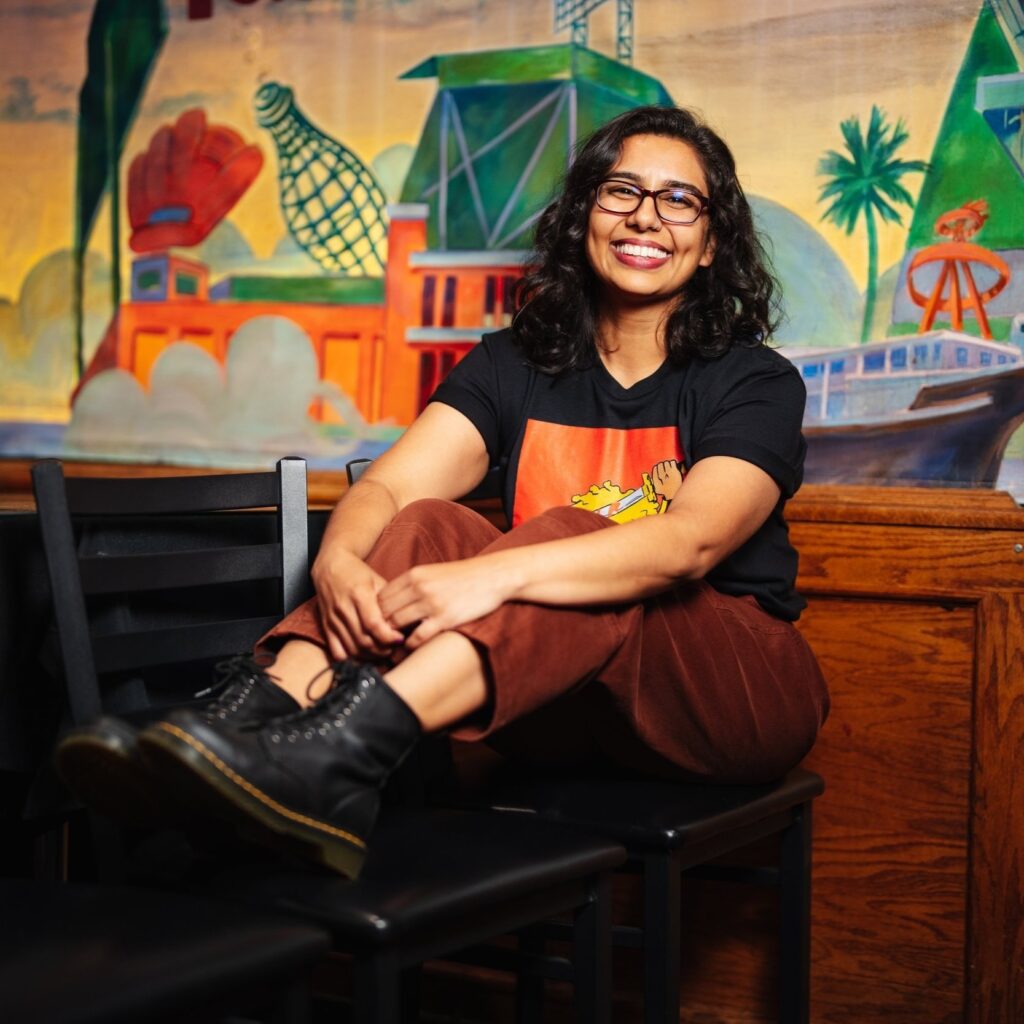Stand-up comedian Shanti Charan has been making Bay Area audiences laugh for 15 years, at venues like Cobb’s Comedy Club, the Punchline or Sketchfest in San Francisco, or working with comedians such as Hasan Minhaj, Atsuko Okatsuka, and Todd Barry.
Yet she believes she’s finally finding her comedic voice, and it’s from two unlikely places. One: getting her Master’s Degree at San Francisco State University in Communications Studies with an emphasis on social justice (during the height of the COVID pandemic no less). Upon graduation, she began teaching at her SFSU alma mater via Zoom.
Which brings us to place number two: Her first time teaching in-person, standing in front of a classroom, is instructing people in jail. Charan teaches at the Elmwood Correctional Facility in Milpitas through Fremont’s Ohlone College’s Rising Stars program; Rising Stars offers college level courses to incarcerated people. She was one of the first people hired for the program.
“I see it as a blessing because when I’m not working in incarceration, when I’m at a university, it’ll make me an even more awesome teacher,” Charan tells 48 Hills. “Education should be decolonized in terms of who is shaping it, who is creating it, who has access to it to benefit their own life, who has access to it to help people critically think.”
Charan is an Indo-Fijian comic, the daughter of immigrants. Decolonizing education and racism in academia has been a driving force for her. That’s what makes her teaching in prison—an institution that can be called a penal colony—a unique experience because education is, “really shaped by a lot of white people, white men specifically, and only accessible to… it’s called the ivory tower, people with money. To people with privilege,” she says. “What happens to underprivileged people in that sense is what this program is meant to disrupt.”
Charan takes a moment to recognize her own privilege: It’s a privilege to go through the “normal” paces that takes one from high school to college, doing book work, securing diplomas to certify graduation then venturing into the workforce. Her incarcerated students by definition are on a non-traditional education route. Many have taken up school again after previously facing lack of educational opportunities.
Comedy—on stage, and in the classroom—”helps destigmatize the perceptions people have about them,” explained Charan. She’s started talking about teaching incarcerated students in her comedy routine, and it’s a way to humanize a population that exists in dehumanizing circumstances.
“I can talk about the funny stuff while not further marginalizing them,” she says. “I never want to talk about them in a way that makes people feel affirmed in their negative ways of thinking about them, while also still shedding light on the realities, all of it.”
Help us save local journalism!
Every tax-deductible donation helps us grow to cover the issues that mean the most to our community. Become a 48 Hills Hero and support the only daily progressive news source in the Bay Area.
Like students at any point in their studies, hers can get overwhelmed. Charan says that making lessons relatable and engaging, and helping students reframe a subject so they can understand it, comprise her daily challenges. “Stand-up helps me be a good teacher but it also helps me be a good disruptor of hegemony,” she says. “Hegemony has the power to make people think all these students are bad citizens and bad people, but they’re just people that were held down by circumstances a lot of the time.”
The reality is it’s easy for people to judge her students because they have no idea what they go through. For example, some may think the classes are elementary, when in fact they are accelerated three-hour sessions for eight weeks, which in normal context would be spread out over 16-weeks, meeting twice a week for around an hour. It’s a necessity, so they are more likely to get credit for the class instead of receiving no recognition for taking the course after getting sentenced or released.
Students can also face the disappointment of correctional officers canceling class. The classes can dwindle in size dramatically: People get sent to solitary confinement, go to prison, succumb to depression or illness, get out. A class that might start with 25 students can end up with ten. Even the most willing and best student can be struggling as someone with an undiagnosed learning disability, handling addiction or a medical condition, or what’s been happening with their loved ones outside.
“Their minds can be somewhere else. They’re also dealing with trauma,” said Charan. “So making the class fun, and engaging, and captivating, that’s where my stand-up and humor really translates to that atmosphere. We could be talking about post-colonialism and how it impacts sexual agency within Indian people in the diaspora and I’ll make that shit funny.”
Charan admits she gets defensive of her students because she hears all the stereotypes and negativity about them, but not one simple truth—they’re smart. Navigating the politics and power dynamics of poverty and jail isn’t for the faint of heart and requires savvy interested parties would identify as intelligent. “They can still understand a lot of these concepts if I make it accessible to them,” said Charan.
Perhaps the most important note about everything: Education prevents people from recidivating. A quality education can be a crime deterrent. Charan doesn’t know what happens to her students once their class ends, but she approaches every lesson with the belief they’re more likely to take advantage of a Pell Grant or apply what they learned in a civilian job when they get out, instead of getting locked up again.
Under the communication studies umbrella, Charan teaches interpersonal, intercultural skills, conflict management, listening, and sexuality and gender topics, in service of challenging students to be harmonious with different identities, expressions, and themselves. Gender roles can be oppressive, managing conflict with avoidant styles can be destructive, using violent communication can lead to resentment—these are concepts anyone can grasp, says Charan. The “homegirl” energy that guided her to be a stand-up comedian in the first place allows her to reach her students even if she takes a light roasting, as if they were hecklers at a club.
“I’m totally the coolest teacher they’ve ever had,” she jokes. Callbacks (referring to a previous joke) are a particular comedy tool that comes in handy in the classroom, she says, where students can callback to a previous concept or lesson, and move the conversation forward, which “encourages them in a way that makes them feel good. Humor helps them receive what I am teaching; it makes it fun.” How she describes her comedy demonstrates just how much her voice on stage can mirror her personality in the classroom.
“I’m going to give you a teacher vibe,” says Charan of the comedy voice she’s honing and presenting to Bay Area audiences, on the outside or incarcerated. “We’re going to laugh and learn. I’m going to make you laugh about shit while also gaining some perspective and I’m going to do it in a way that makes you feel good, not in a way that it feels forced upon you, but we’re going to learn a little bit, even if it’s about your digestive system.
“When I’m teaching, I don’t just feel like I’m in a scary, threatening place with a bunch of scary, mean, violent people,” Charan said. “I feel like I’m in a place where this is my work, sometimes we laugh. Sometimes we laugh really good. Sometimes it’s boring. Sometimes I want to leave, so I can go home and poop.”

Unfortunately, this wouldn’t be a teacher’s story without involving creative ways to get supplies to students enduring an underserved and inequitable environment. Charan understands that women’s facilities with limited resources perpetuate marginalization, so she decided to step up in a small way. Adopting a phrase from one of her jokes, she created a “boop boop” acrylic painting art series she’s selling through Women’s History Month to contribute to local art therapy programs for incarcerated women. The colorful paintings of breasts are meant to elevate women’s bodies with their bold coloring, calling attention to the subject matter.
Charan’s fusion of academia and laughter has borne out too on her podcast, Mouthful with Shanti, centering marginalized people, identities, and experiences for audiences to learn through funny and candid conversations. She cites comics Roy Wood Jr. and Sheng Wang among her modern influences, thinking comics who are straight-up funny without being preachy. The way Bay Area audiences receive Charan leads her to believe she’s onto something with her newfound comedic voice.
“Modern Asian women are really happy to see a voice be disruptive of typical feminine expectations, being assertive and strong and confident,” she says. “I’ve been approached with, ‘you’ve changed my idea of what an Indian woman can be, what they can talk about’ and also how people think about people who are incarcerated.”
Keep up with Shanti’s shows here, listen to her podcast, and follow her on Instagram.





